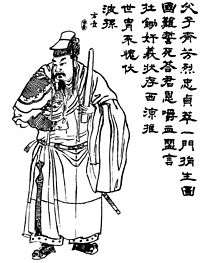Ma Teng
| Ma Teng | |
|---|---|
|
A Qing dynasty portrait of Ma Teng | |
| Warlord of Eastern Han dynasty | |
| Born | (Unknown) |
| Died | 212 |
| Names | |
| Traditional Chinese | 馬騰 |
| Simplified Chinese | 马腾 |
| Pinyin | Mă Téng |
| Wade–Giles | Ma T'eng |
| Courtesy name | Shoucheng (simplified Chinese: 寿成; traditional Chinese: 壽成; pinyin: Shòuchéng; Wade–Giles: Shou-ch'eng) |
Ma Teng (died 212),[1] courtesy name Shoucheng, was a warlord who lived during the late Eastern Han dynasty. He controlled Liang Province (涼州; covering parts of present-day Shaanxi and Gansu) with another warlord, Han Sui. Ma Teng and Han Sui were involved in efforts to gain autonomy from the Han central government.
Life
Ma Teng was from Maoling, Fufeng (扶風茂陵; present-day Xingping, Shaanxi). His father, Ma Ping, was a minor official in Tianshui Commandery, but because of some dispute he was dismissed from his post, and went to live among the Qiang people.
When Ma Teng was young, he lived in extreme poverty and it is said that he collected firewood in the mountains and sold it to make money. When he grew up, his height was said to have been over eight chi, (roughly 1.84 meters). It is also said that although he was fierce in appearance, he was kind to others and wise, and was respected by many.
In 184, during the final years of Emperor Ling's reign, the Qiang people in Liang Province rose up against the local government under Beigong Yu (北宫玉) and Li Wenhou (李文侯). They were joined by members of the local gentry Han Sui and Bian Zhang. The official Han governor of Liang Province, Geng Bi (耿鄙), gathered forces to put down the rebellion, and Ma Teng volunteered as a foot soldier. His skills in battle against the rebels were recognized, and he rose through the ranks of the soldiery. However, when Geng Bi was killed in battle by the rebel army, Ma Teng switched sides and joined Han Sui. The rebellion would eventually be put down by the Han general Huangfu Song, but Ma Teng escaped along with the rebels. Eventually, the central government granted those involved in the rebellion military titles in order to appease them.
When Li Jue and Guo Si seized power over Chang'an after Dong Zhuo's assassination, Ma Teng and Han Sui at first pledged allegiance to them, and were given the titles of "General who Suppresses the East" (征東将軍) and "General who Guards the West" (鎮西将軍) respectively. However, the relationship between the two sides quickly soured, and Ma Teng and Han Sui led their armies in an attempt to seize Chang'an. They allied themselves with the warlord Liu Yan, but suffered defeats from the hands of Li's generals, Guo Si, Fan Chou and Li Li. Not only was the loss of ten thousand soldiers a heavy blow to the morale of the allied forces, they also faced a supply shortage at the time, so the eloquent Han Sui asked Fan for a private talk, during which Han successfully persuaded Fan to abort the pursuit because they shared the same hometown. The allied force then retreated back to Liang Province safely.
Although Ma Teng was the sworn brother of Han Sui, the two went to war against each other over control of Liang Province. The fighting escalated to a point where they were killing each other's wives and children. Cao Cao, who at this point had decisively defeated Yuan Shao at the Battle of Guandu, brokered peace between Ma and Han, who then pledged allegiance to Cao Cao and sent troops to assist the latter on his war against the remnants of Yuan's legacy. After this, Ma Teng was summoned to Ye with most of his family, where his Liang Province positions were taken away. He was made Imperial Commandant of Capital Guards. His eldest surviving son Ma Chao remained behind in Liang Province with Han Sui. When Ma Chao and Han Sui defied Cao Cao and took up arms against him, Ma Teng, along with every member of his family that accompanied him (roughly two hundred persons, according to Ma Chao's lament on a New Year's Day), was executed.
Family
Appointments and titles held
- Commandant of Tianshui and Langan (天水蘭干尉)
- Major (司馬)
- Lieutenant General (偏將軍)
- General Who Attacks the West (征西將軍)
- General Who Attacks the East (征東將軍)
- General of the Vanguard (前將軍)
- Marquis of Huaili (槐里侯)
- Minister of the Guards (衛尉)
- Inspector of Xu Province (徐州刺史)
- Counsellor Remonstrant (諫議大夫)
In fiction
In Luo Guanzhong's historical novel Romance of the Three Kingdoms, Ma Teng was portrayed as a character loyal to the fading Han Dynasty. He participated a plot with Liu Bei and Dong Cheng to assassinate Cao Cao, but the plot was not successful and he returned to Liang Province.
When he was later recalled to Xuchang by Cao Cao, he decided to again join an assassination plot, this time with Huang Kui (黄奎). However, the plot was discovered and he is executed along with his sons Ma Xiu and Ma Tie. Upon hearing of his father and brothers' deaths, Ma Chao becomes filled with rage and goes to war with Cao Cao to avenge his family, starting the Battle of Tong Pass.
